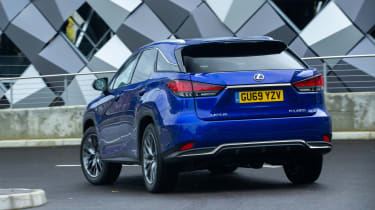Lexus RX SUV (2016-2022) - Engines, drive & performance
The Lexus RX is only available with a petrol hybrid engine. Fans of diesel SUVs will need to look elsewhere
This Lexus RX is faster than the previous model, but in reality it hasn't caught up to rivals such as the Porsche Cayenne, BMW X5 or Volvo XC90 in terms of driving enjoyment. The steering and suspension have been tweaked to improve how the car handles corners, but it still leans a bit too much and the steering isn’t very involving.
On the plus side, this is a very smooth, quiet and refined car on the move – so if that's what you're looking for rather than sharp handling, you'll be more than satisfied. It also comes with four-wheel drive as standard, adding confidence in poor weather conditions.
Lexus RX hybrid engine
The 308bhp RX 450h is capable of 0-62mph in 7.7 seconds but it never feels quite that fast when you put your foot on the accelerator because its CVT automatic gearbox hampers the car’s responsiveness. Choose the heavier RX L and the 0-62mph time also suffers, dropping to eight seconds exactly.
As well as the alterations to the steering and suspension setups, the RX is stronger and stiffer than older versions, which improves the car’s ability to corner and change direction quickly. An adjustable suspension system called Adaptive Variable Suspension (AVS) is fitted in the F Sport and Takumi versions. This allows you to make the suspension softer for maximum comfort when cruising or firmer when driving on a twisty road.
All versions of the RX 450h come with a drive select system that lets you switch between EV, Eco, Normal and Sport modes for better performance or better economy. The F Sport version comes with additional Sport S and Sport S+ modes, which stiffen up the suspension, improve throttle response and make the steering heavier.
The only problem is that the differences are really quite subtle and they don’t suddenly transform the big SUV into a true driver’s car, so it's best left in Normal or Eco.











